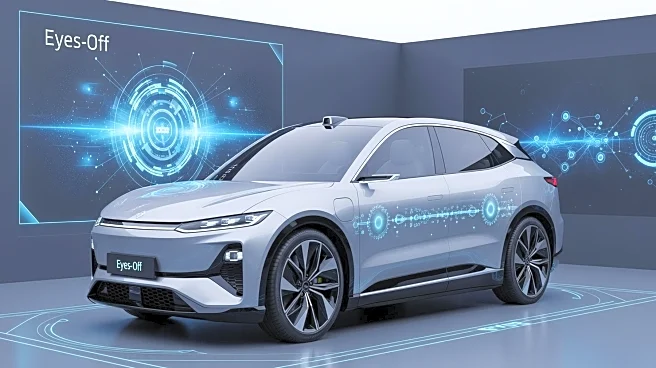What's Happening?
General Motors (GM) has announced a significant update to its vehicle lineup, focusing on integrating advanced artificial intelligence and machine learning features. The company plans to introduce a new
centralized computing platform across its fleet, alongside in-vehicle conversational AI chatbots tailored to individual preferences. A standout feature, set to debut in 2028, is the 'eyes-off' driving capability in the Cadillac Escalade IQ electric SUV. This technology allows drivers to engage in other activities while the vehicle autonomously navigates mapped highways. The system utilizes lidar, radar, and cameras to ensure safety and reliability. GM's announcement comes at a time when the American electric vehicle industry faces declining sales due to the expiration of the electric vehicle tax credit and rising costs. Despite these challenges, GM remains committed to electrifying its fleet by 2035.
Why It's Important?
The introduction of 'eyes-off' driving technology by GM represents a significant advancement in autonomous vehicle capabilities, potentially reshaping consumer expectations and driving demand for electric vehicles. As the industry grapples with declining sales, innovations like these could provide a competitive edge, attracting tech-savvy consumers interested in cutting-edge features. However, the broader market impact remains uncertain, as high costs and reduced incentives continue to challenge the EV sector. GM's commitment to electrification and autonomous technology underscores its strategic focus on long-term sustainability and leadership in the automotive industry. The success of these initiatives could influence other automakers to accelerate their own technological advancements, potentially leading to increased investment in AI-driven vehicle solutions.
What's Next?
GM plans to continue developing its autonomous driving technology, building on its existing Super Cruise system. The company aims to refine and expand its AI capabilities, including the introduction of a custom-built AI for personalized vehicle experiences. As GM navigates the current market challenges, it anticipates a stabilization of EV demand by early 2026. The company is optimistic that its diverse range of electric vehicles and innovative features will bolster sales once the market finds its equilibrium. Additionally, GM's collaboration with former Tesla executive Sterling Anderson may enhance its autonomous driving initiatives, potentially positioning GM as a leader in the field. Stakeholders, including consumers and industry competitors, will be closely monitoring GM's progress and market response to these developments.
Beyond the Headlines
The ethical and safety implications of 'eyes-off' driving technology are significant, as autonomous vehicles must ensure passenger safety while navigating complex road conditions. GM's experience with autonomous driving, including past challenges with its robotaxi division, highlights the importance of transparency and regulatory compliance. The integration of AI chatbots and personalized vehicle experiences raises questions about data privacy and the extent to which consumer preferences will be monitored and utilized. As GM advances its AI-driven initiatives, it must address these concerns to maintain consumer trust and regulatory approval. The long-term impact of these technologies could lead to shifts in driving culture, with increased reliance on AI for navigation and vehicle management.









